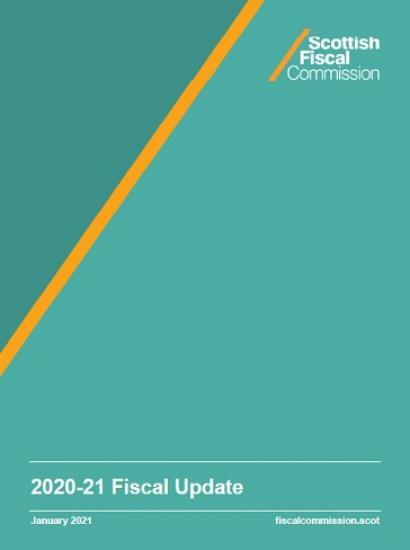Scottish Fiscal Commission Gets Behind The Budget
29th January 2021

This Fiscal Update, published at the same time as our Scotland's Economic and Fiscal Forecasts (SEFF), sets out how the 2020-21 Scottish Budget has changed since it was set in February 2020.
Foreword
The coronavirus (COVID-19) pandemic has had a profound effect on the fiscal and economic outlook in Scotland and the UK.
Over the course of 2020-21 the UK Government's public health response and associated restrictions have evolved, and successive UK Government announcements resulted in additional funding for the Scottish Government. As a result, the 2020-21 Scottish Budget has increased by 19 per cent, or £8 billion since it was set in February 2020.
In July the UK Government first announced a guaranteed minimum level of funding for COVID-19 of £6.5 billion to provide the Scottish Government with more certainty in its budget management. This has since been increased three times, most recently to £8.6 billion in December 2020. Funding could increase again if spending by the UK Government is higher than expected in December. The later in the financial year additional funding from the UK Government arrives the more difficult it is for the Scottish Government to manage its budget. There is variability in Scottish Government expenditure too, as public health decisions create a need for additional expenditure, for example in grants to businesses forced to close because of restrictions. This unprecedented variability in both funding and expenditure needs makes it difficult for the
Scottish Government to balance its budget in 2020-21 as well as to plan for 2021-22. Additional funding is important and welcome, but the later it comes in the budget year, the harder it is to spend it effectively.
In addition there have been a number of changes to Scotland and UK policies relating to the 2020-21 tax year, such as the increased starting threshold for residential Land Building Transaction Tax, and the UK Stamp Duty relief. Even though there have been some differences in policy between the UK and the Scottish Government, the pandemic has had similar effects on tax revenues and social security spending in Scotland and the rest of the UK. This means that our forecasts and the Block Grant Adjustments (BGAs) have changed in a similar manner, leading to a broadly unchanged net effect for the Scottish Government.
We have previously highlighted the risk that differential effects in Scotland and the rest of the UK could result in differences between the BGAs and revenues and spending in Scotland, this risk has not emerged this year.
This Fiscal Update is released at the same time as our Scotland's Economic and Fiscal Forecasts (SEFF) publication, which sets out our five-year forecasts of the Scottish economy, tax revenue, social security spending and commentary on the 2021-22 Scottish Budget. Although this publication concerns the 2020-21 Scottish Budget rather than the 2021-22 Scottish Budget, in the SEFF we do reference much of the analysis here because we expect similar issues to arise as COVID-19 continues to significantly affect the 2021-22 Scottish Budget.
Extracts
Resource spending covers day-to-day costs (such as wages, purchasing goods and services, and grants and subsidies).2 Resource spending is funded through the resource block grant from the UK Government, devolved tax revenues and resource borrowing. Overall resource funding has increased by £7.9 billion, or 21 per cent since the Budget was introduced on 6 February 2020.
These increases have taken place throughout the year, and it is possible there will be further increases in the Scottish Government's funding if the UK Government's spending increases as a result of recent COVID-19 restrictions in England.
Land and Buildings Transaction Tax (LBTT) and Scottish Landfill Tax (SLfT) are fully devolved taxes. Changes to our forecasts and Block Grant Adjustments affect the budget in-year.
2.6 Our forecast of revenues from LBTT and SLfT have fallen by £145 million since February. This is in line with the reduction in corresponding tax revenues collected by the UK Government so is largely matched by a positive £166 million change to the BGAs. The combined effect of changes to our and the OBR's forecasts is an increase of £21 million in the Scottish Budget in 2020-21 shown in
Figure 2.1
2.8 Non-Domestic Rates (NDR) have been the responsibility of the Scottish Government since devolution began. They are not covered by the fiscal framework and do not have a corresponding BGA like other devolved taxes. Instead funding for NDR is included in the Block Grant with additional spending on business rates in England resulting in additional funding for Scotland. This year, the Scottish Government granted a new NDR relief for retail, hospitality and leisure properties as well as a universal relief reducing tax due in 2020-21 because of COVID-19 restrictions. Funding for the NDR reliefs was received as part of the COVID-19 additional funding following UK Government changes to business rates in England.
Read the full report HERE
